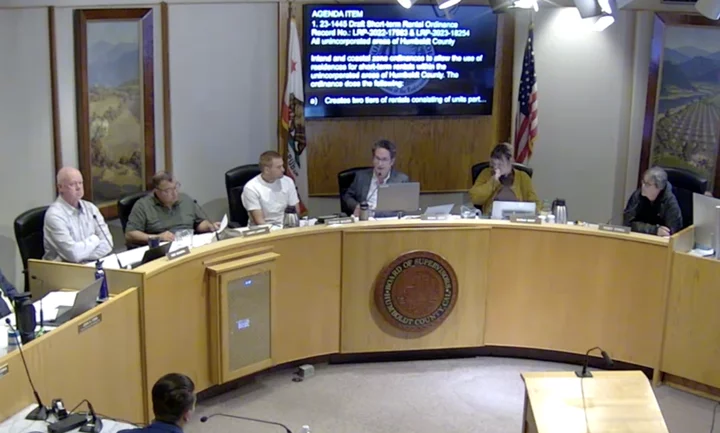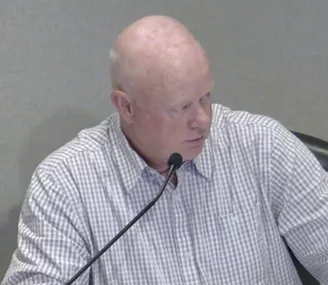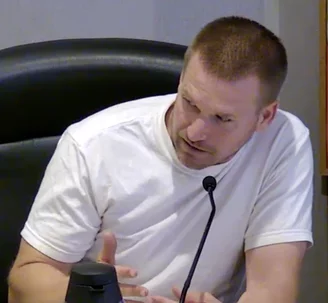Screenshot of Thursday’s Humboldt County Planning Commission meeting.
###
###
It looks like it’s going to be another few weeks before the Humboldt County Planning Commission makes a final decision on proposed regulations for short-term vacation rentals.
Commissioners had hoped to come to a consensus by the end of Thursday’s meeting, but, alas, after more than three and a half hours of going through the draft ordinance section by section, the commission unanimously voted to continue its discussion at its next meeting on Nov. 2.
The proposed rules would provide a regulatory framework for the permitting and operation of short-term rentals – defined as the rental of a dwelling for 30 consecutive days or less through services such as Airbnb or Vrbo – in unincorporated areas of Humboldt County. The regulations seek to protect neighborhood integrity and prevent the loss of available housing, while also providing tourists with more accommodation options and economic opportunities for property owners who aren’t interested in renting to long-term tenants.
Of the 34,093 residential units in unincorporated Humboldt County, approximately 567, or 1.66 percent, are being used as short-term rentals. To ensure short-term rentals don’t overwhelm the Humboldt Bay region, where housing availability is already impacted, the total number of permits would be capped at two percent of the total housing stock.
The draft ordinance would also establish standards for the operation of short-term rentals to mitigate neighborhood impacts, such as noise and parking issues.
Operators with proof of pre-existing operations would be given priority under the proposed rules.
“No permits for whole dwelling unit Short-term Rentals shall be issued during the first two months following the effective date of this section but applications from individuals operating existing short-term rentals will be received,” according to the text of the ordinance. “Two Three months after the effective date of this ordinance the department will issue permits for qualifying locations with existing Short-term Rentals. … If the number of permits issued for existing Short-term Rentals exceeds the cap … then no permits will be issued for new Short-term Rentals until the number of permitted Short-term Rentals in the County falls below the cap.”
During a recent public hearing on the matter, the commission asked staff to include a provision in the ordinance that would prevent operators with unresolved violations on the property from being permitted. “Violations which have been remedied will be allowed the same pathway forward as other operators,” the ordinance states. “Properties where violations exist will not be considered for [rentals].”
The Planning Commission agreed to hear public comment before deliberating on any of the proposed changes. Overall, public opinion of the draft document was fairly mixed.
Layal Bata, a policy and research analyst with the Los Angeles-based housing advocacy group Better Neighbors, asked the Planning Commission to reduce the suggested two percent cap on short-term rentals to one percent of the total housing stock and to prohibit short-term rentals from operating within a multi-family structure.
“Like many counties throughout California, Humboldt is facing a housing affordability crisis,” she said. “In the City of Los Angeles, we’ve seen firsthand how short-term rentals have contributed to rising housing costs. According to a McGill University report published last year, short-term rentals have contributed to an increase in rents by $810 and have taken 2,500 homes off the long-term market since 2015. Meanwhile, in Humboldt County, rents have increased $250 since 2015, with the number of unhosted short-term rentals [in the coastal zone] increasing to 25 percent since 2022.”
Arcata resident Raelina Krikston asked commissioners to eliminate short-term rentals without a caretaker resident, meaning someone who lives on the property they are renting out.
“In doing so this would open up hundreds if not thousands of homes up to first-time homebuyers and long-term renters in our community who currently need homes and are seeking upward home mobility,” she said. “[T]he number of short-term rentals in our county represents a significant portion of our housing stock that is being lost to commercial ventures. Based on our current [Regional Housing Needs Allocation] RHNA, 3,390 new homes are needed and the current number of [short-term rentals] in our county [is] equivalent to 26 percent of our RHNA needs.”
Krikston also spoke in favor of limiting short-term rentals to one per individual or business as opposed to five. She also expressed support for an overall cap of one percent.
Speaking to the other side of the issue, Southern Humboldt resident Chip Titman said short-term rentals offer “a lifeline” to rural communities where housing availability isn’t a pressing issue.
“They are an economic engine for tourism and a pathway beyond the dying cannabis economy,” he said. “Please don’t over-regulate the rural short-term rental operators, forcing them out of business and increasing the economic slide in rural and Southern Humboldt.”
McKinleyville resident and short-term rental operator Seth Naman said short-term rentals offer a cheaper option for folks visiting the area.
“If you want to stay at the Holiday Inn [by the airport] on a weekend in August [of 2024], that’s going to cost you $304 for one night [and] one room,” he said. “Like it or not, we are a tourist area. … People want to come here and they don’t want to stay in a hotel room, they want to have a more organic experience at a short-term stay. … A lot of us short-term rental operators, we live here, we’re in the community, we spend our money here, raise our kids here and the income that’s generated from the short-term rentals really is a part of how we get by.”
Several other commenters spoke, touching on many of the same issues.
Before delving into the document, Commissioner Iver Skavdal acknowledged the “overall lack of housing” in Humboldt County. “[There is] a lot of concern which I also share.”
“We don’t have many tools in our toolkit, so it seems like people are grabbing on to this short-term rental regulation as perhaps one opportunity to solve that problem. Personally, I think it’s not,” Skavdal said. “Frankly, we’re not building houses in Humboldt County right now, which is the problem. … The last 10-year average, we’ve built about 115 single-family dwellings a year – about .33 percent of the housing stock. … I think we need to turn our attention to what’s causing what’s the difficulty. Why are we not building new homes in Humboldt County?”
Commissioner Sarah West said she felt short-term rental regulations could serve as a “tool in the toolbox when it comes to housing,” but agreed that the construction of more housing should be a priority. “While I don’t think it’s a solution to our housing struggles, it does impact our housing availability and we ought [to] have some sideboards on converting housing into businesses.”
Commissioner Thomas Mulder asked fellow commissioners to avoid putting unnecessary or unfair restrictions on short-term rental operators that wouldn’t apply to long-term renters.
“If we heavily regulate one end, that doesn’t mean another end that’s already regulated isn’t providing the needs through the appropriate regulations as it is,” he said, seemingly referring to rules already implemented through Airbnb or VRBO.
Commissioner Peggy O’Neil expressed sympathy for both sides of the issue, noting that she’s “all for supporting people who want to live in our community to have a source of income on their property,” but said she didn’t want to see outside investors buying up properties to turn into short-term rentals that will price out local folks.
“Or even expensive long-term rentals that are pricing people out of living in Humboldt County or having to radically change their lifestyle so that they can’t have a single-family home,” she said. “They have to rent a bedroom or they’re facing homelessness because they can’t afford rent anymore. It’s ridiculous. If you don’t already have a home, good luck getting one. Even if you’re a school teacher or work for a service district, you can’t even afford a house anymore.”
Commissioner Lonyx Landry said it took him three months to find a rental that he was “overqualified for” when moving back to Humboldt County in recent years.
From there, the commission spent two-and-a-half hours going through the ordinance section by section. They approved a few sections of the ordinance but got caught up talking about who and what would qualify as a home share rental.
As the meeting hit the three-and-a-half-hour mark, commissioners agreed to wrap up the discussion. Ford suggested the commission continue the discussion and finish its review of the draft ordinance at its next meeting on Nov. 2. Staff will come back with the final revisions on Nov. 16.
Landry made a motion to that effect, which was seconded by Mulder. The motion passed in a unanimous 6-0 vote, with Commissioner Brian Mitchell absent.



CLICK TO MANAGE